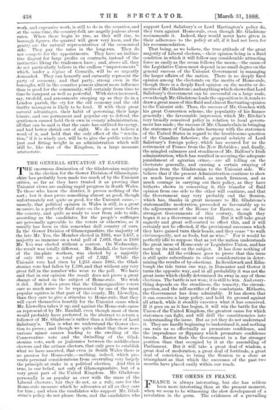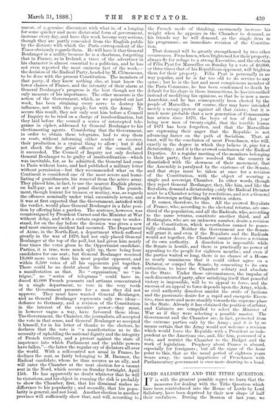THE OMENS IN FRANCE.
VRANCE is always interesting, but she has seldom been more interesting than at the present moment, when we seem to be witnessing the slow development of a revolution in the germ. The evidences of a prevailing unrest, of a genuine discontent with what is, of a longing for some quicker and more dictatorial form of government, increase every day, and have this week become very serious, though they are partly concealed from the English public by the distaste with which the Paris correspondent of the Times obviously regards them. He will have it that General Boulanger is a nullity because he is a charlatan, forgetting that in France, as in Ireland, a trace of the advertiser in his character is almost essential to a politician, and he has not even reported the most ominous fact of the week,— the decision of the Radical Party, headed by M. Cl6menceau, to be done with the present Constitution. The members of that party, if they know nothing else, at least know the lower classes of France, and the intensity of their alarm at General Boulanger's progress is the best though not the only measure of his importance. The other measure is the action of the Government, which, as we pointed out last week, has been straining every nerve to destroy his influence, not with the people, but with the Army. To secure this result, they not only sent him before a Council of Inquiry to be tried on a charge of insubordination, but they laid before the council a series of intercepted tele- grams in cipher, addressed by General Boulanger to his electioneering agents. Considering that the Government, in order to obtain these telegrams, had to stop them en route, without informing either sender or receiver, their production is a. cynical thing to allow ; but it did not shock the five great officers of the council, and it succeeded. The Council of Inquiry not only declared General Boulanger to be guilty of insubordination—which was inevitable, for, as he admitted, the General had come to Paris without leave, and had published a military letter without permission—but they recommended what on the Continent is considered one of the most severe and humi- liating of punishments, his removal from the active army. They placed him, in fact, to use the nearest English phrase, on half-pay, as an act of penal discipline. The punish- ment, though lenient for treason or mutiny, was, as regards the offences nominally under trial, excessively severe, and it was at first expected that the Government, satisfied with the verdict, would place General Boulanger in a false posi- tion by offering him a pardon. The sentence, however, was countersigned by President Carnot and the Minister at War without delay, and with a certain eagerness easy to under- stand, for on the day before the decision was given a new and most ominous incident had occurred. The Department of Aisne, in the North-East, a department which suffered greatly in the war of 1870, had not only placed General Boulanger at the top of the poll, but had given him nearly four times the votes given to the Opportunist candidate. Parties, it is true, were much split up, there being four candidates for one seat ; but General Boulanger received 19,000 more votes than his most popular opponent, and within 6,500 votes of all his opponents put together. There could be no doubt about the meaning of such a manifestation as that. No "organisation," no "in- trigue," no "series of telegrams" could have in- duced 45,000 French peasants and artisans concentrated in a single department, to vote in the very teeth of the Government pressure for a man they did not approve. They must have wanted General Boulanger, and as General Boulanger represents only two ideas— defiance to Germany, and a revision of the Constitution in the interest of the executive power—they must, in however vague a way, have favoured those ideas. The Government, the Chamber, the journalists, all accepted the vote in that sense, and General Boulanger so accepted it himself, for in his letter of thanks to the electors, he declares that the vote is "a manifestation as to the necessity of upholding the national dignity and the integrity of French territory, and a protest against the state of impotence into which Parliament and the public powers have fallen,"—the latter the regular cry of dictators all over the world. With a self-control not usual in France, he declines the seat, as fairly belonging to M. Daumer, the Radical candidate, whom he thus secures as an ally, and will enter the Chamber at the next election for a vacant seat in the Nord, which occurs on Sunday fortnight, April 15th. He has apparently no doubt whatever that he will be victorious, and his object in running the risk is probably to show the Chamber, first, that his dismissal makes no difference to his popularity ; and secondly, that his popu- larity is general, and not local. Another election in another province will sufficiently show that, and will, according to the French mode of thinking, enormously increase his weight when he appears in the Chamber to demand, as his friends say he will demand, as the single item in his programme, an immediate revision of the Constitu- tion.
That demand will be greatly strengthened by two other occurrences. Frenchmen, when frightened for their property, always fly for refuge to a strong Executive, and the election of F6lix Pyat for Marseilles on Sunday by a vote of 40,000, or three times that of his Republican opponent, will frighten them for their property. F6lix Pyat is personally in no way popular, and he is far too old to do service to any cause ; but he is the last and most conspicuous member of the Paris Connuuue, he has been condemned to death by default for his share in those transactions, he has intensified instead of modifying his opinions, so that he is now a mere Anarchist, and he has consequently been elected by the people of Marseilles. Of course, they may have intended merely a savage protest against all that exists ; but it is much more probable that a new generation of Communists has arisen since 1870, the boys of ten of that year being now men of twenty-eight, that the terrible lesson of 1871 has been forgotten, and that the Marseillois are expressing their anger that the Republic is not advancing faster on the path of Socialism. That, at least, will be the conclusion of most Frenchmen, who will, exactly in the degree in which they believe it, pine for a. dictatorship ; and it is the avowed conclusion of the Radical Deputies. At a regular meeting of the members belonging to their party, they have resolved that the country is dissatisfied with the slowness of their movement, that the Assembly is paralysed by the existence of the Senate, and that steps must be taken at once for a revision of the Constitution, with the object of securing a single and sovereign Chamber. In other words, though they reject General Boulanger, they, like him, and like the Royalists, demand a dictatorship ; only the Radical Dictator must be a Chamber acting by resolutions, and not a General or a Sovereign acting through written orders.
It comes, therefore, to this. All the avowed Royalists of France, who, according to the electoral returns, are one- third of the population, and all the Radicals, who, according to the same returns, constitute another third, and all Boulangists, who are an unknown number, desire a revision of the Constitution, which nevertheless cannot be peace- fully obtained. Neither the G-overnment nor the Senate will grant it, and even if the Royalists and the Radicals would act together, the Chamber cannot decree a revision of its own authority. A dissolution is impossible while the Senate is hostile, and there is practically no power of appealing to the people for eighteen months ; and even if the parties waited so long, there is no chance of a House so nearly unanimous that it could either agree on a Dictator, or compel the Senate, by consenting to its own extinction, to leave the Chamber solitary and absolute in the State. Under those circumstances, the impulse of each discontented party, after satisfying itself that peaceful victory is impossible, will be to appeal to force, and the success of an appeal to force depends upon the Army, which, as civil authority dissolves amidst the strife of factions and the passionate desire for a rapid and energetic Execu- tive, rises more and more steadily towards the supreme place in the State. Already it has obtained the position of arbiter, and Cabinets are compelled to select the Minister of War as if they were selecting a possible master. The Government and the Chamber are, in fact, protected from the extreme parties only by the Army ; and it is by no means certain that the Army would not welcome a revision which would leave the Republic with a President as inde- pendent as the American one, and, like him, possessed of a veto, and restrict the Chamber to the Budget and the work of legislation. Prophecy about France is absurd, especially for foreigners ; but all the signs of the hour point to this, that as the usual period of eighteen years wears away, the usual impatience of Frenchmen with Parliamentary government is once more drawing to a head.



































 Previous page
Previous page